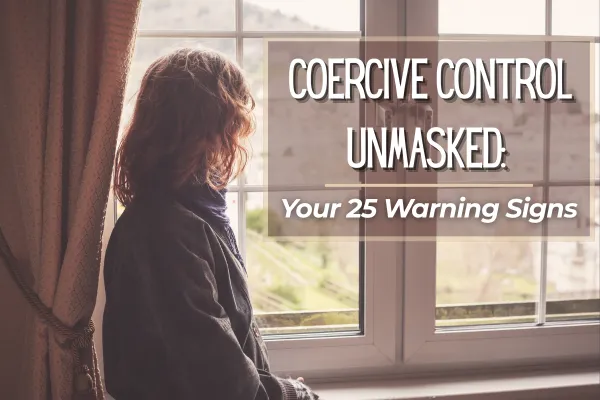
Coercive Control Unmasked: Your 25 Warning Signs
Coercive control isn’t always loud.
It doesn’t always come with bruises, screaming matches, or threats you can record.
Most of the time, it’s quiet.
It’s the constant drip of control that chips away at your independence, confidence, and identity until you barely recognize yourself.
If you’ve been feeling like you’re walking on eggshells or living under someone else’s rules… you might be dealing with coercive control.
Here are 25 real-life examples survivors have experienced because when you can name it, you can fight it.

1. Your schedule is no longer yours
From the moment you wake up to the time you go to bed, they want to know where you are, what you’re doing, and who you’re with.
2. “Checking in” becomes tracking
Texts and calls aren’t about care, they’re about monitoring your every move.
3. Apologies are unsafe
You say “sorry” to keep the peace, but it’s never enough. The criticism keeps coming.
4. You avoid certain topics entirely
Not because you don’t care, but because they always explode into conflict.
5. They ruin good news
You land a promotion, hit a personal goal, or share something you’re proud of; only to be met with sarcasm, dismissal, or a fight.

6. They rewrite history
Things that happened get twisted so you look like the problem, even when you know the truth.
7. You become a “safe” version of yourself
You filter your words, tone, and actions so they won’t get upset.
8. Boundaries are mocked or ignored
If you ask for personal space or time, you’re called selfish, dramatic, or “too sensitive.”
9. They play the victim after hurting you
They flip the script so you end up comforting them for pain they caused.
10. Your social life disappears
Friends stop inviting you because you cancel too often or seem stressed when you go.
11. Parenting becomes a power game
They undermine your authority with the kids so they can play the “fun” parent while you look strict.
12. Your self-care gets erased
Hobbies, haircuts, gym time, even doctor’s visits fall to the bottom of your list to avoid conflict.

13. They “joke” about replacing you
Backhanded comments about leaving or finding someone better are brushed off as humor.
14. You’re expected to read their mind
If they have to explain what’s wrong, you’ve already failed.
15. Household standards change daily
What’s “good enough” depends on their mood, not reality.
16. You have no privacy
They open your mail, scroll your phone, or watch over your shoulder like it’s their right.
17. Every kindness comes with strings
Any favor or gift is later used to guilt you into doing something for them.
18. Everything is your fault
Weather, traffic, and other people’s choices somehow land on your shoulders.

19. They punish with silence
You get days of cold shoulders until you apologize, just to restore peace.
20. Your opinions are automatically wrong
From big decisions to small preferences, your voice doesn’t count.
21. Chaos before important moments
Right before a holiday, event, or meeting, they start a fight to throw you off.
22. Withholding important information
You find out about decisions after they’re made, leaving you powerless.
23. Your home doesn’t feel like yours
You hesitate to decorate, rearrange, or change anything without permission.
24. Guilt for things beyond your control
They make you feel bad for things you couldn’t possibly prevent.
25. Peace always comes with conditions
The “calm” never lasts, it only exists when you meet their unspoken expectations.

Why Naming Coercive Control Matters
Coercive control thrives in the shadows.
The more invisible it looks to outsiders, the more effective it becomes.
And here’s the truth:
Once you can name it, you can see it.
Once you can see it, you can start taking your power back.
If you recognize yourself in these examples, you are not overreacting, you are not “too sensitive,” and you are not imagining things.
You’re living under a form of abuse designed to control you without leaving a mark.
The first step is awareness.
The next step is action.
